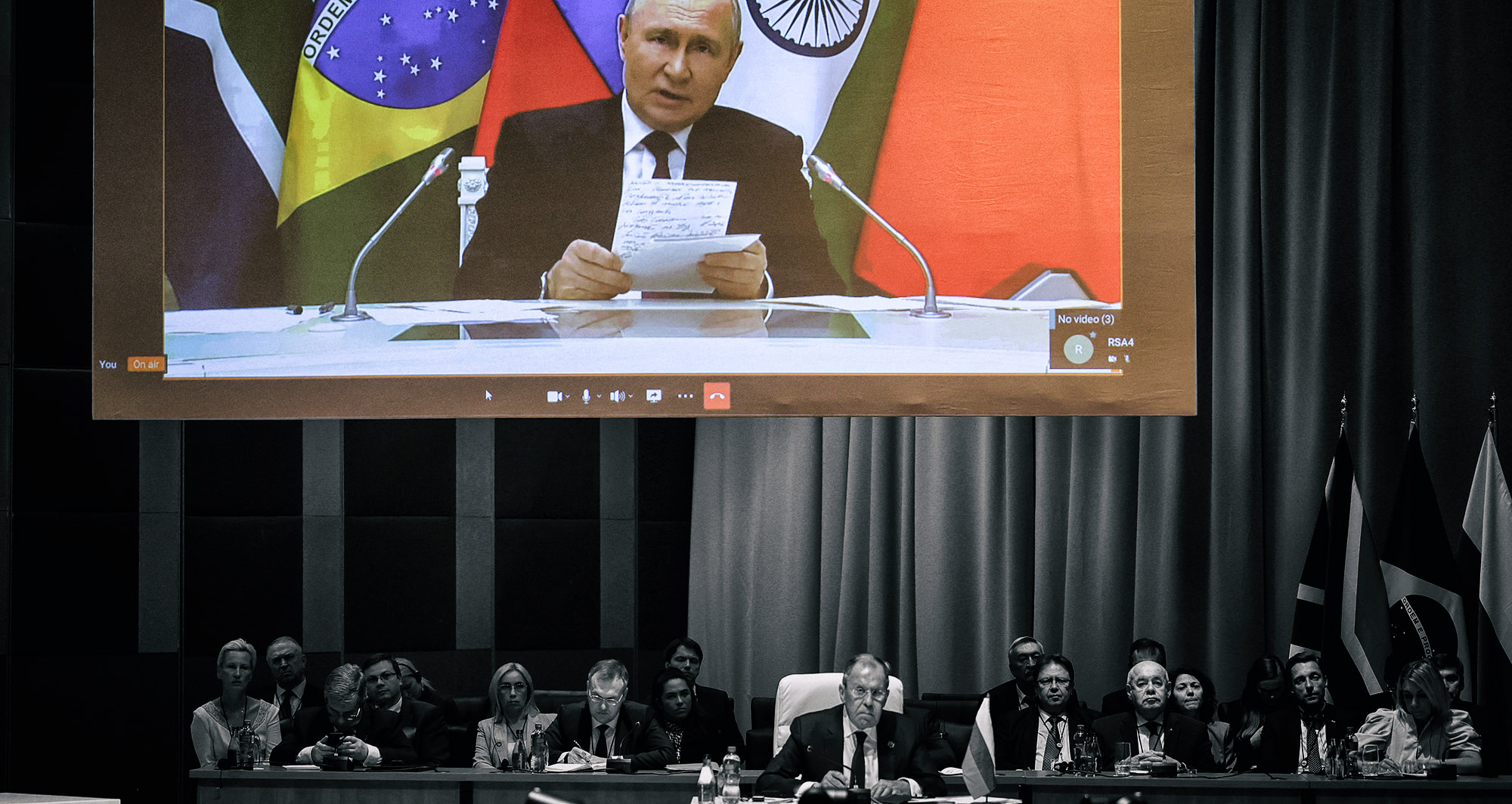Russian President Vladimir Putin appears to have failed in his attempt at the BRICS summit in Sandton to drum up support from fellow leaders of the bloc for his war effort in Ukraine.
Putin, addressing the summit by video from Moscow, presented a narrative of his invasion of Ukraine as effectively an act of self-defence against Ukraine and the West for mounting a coup in Ukraine in 2014 against the pro-Russian President Viktor Yanukovych and then attacking pro-Russian elements in Ukraine’s Donbas region.
But the other four BRICS leaders who were physically present at the summit – President Cyril Ramaphosa, Chinese President Xi Jinping, Brazilian President Lula da Silva and Indian Prime Minister Narendra Modi did not publicly support his justification in their responses.
/file/dailymaverick/wp-content/uploads/2023/08/11668896.jpg)
Putin blamed the Ukraine war, by implication, on the West. He said “some countries” – a clear reference to the US and other countries of the West – were promoting their own hegemony in pursuit of a policy of ongoing colonialism and neo-colonialism.
Read more in Daily Maverick: Putin, via video link, uses BRICS gathering to justify Russia’s war in Ukraine
He said their aspirations for hegemony in the world had led to the dire crisis in Ukraine. They had supported an unconstitutional coup in Ukraine and after that, they launched a war of attrition which had lasted eight years against those who did not support the coup. And so Russia had decided to support those people who were fighting for their culture, their possessions, their language and their future.
“Our actions in Ukraine were guided by only one thing: to put an end to the war which was unleashed by the West against the people of Donbas.”
Read more in Daily Maverick: Putin’s failure of historic proportions to rewrite history
In his direct response to Putin, Ramaphosa merely said, “We agree that the war can only be resolved by negotiations which you have always said you support.”
In his speech to the summit, President Lula simply said: “We cannot avoid dealing with the main current conflict taking place in Ukraine with global effects.”
He emphasised that “Brazil’s historic stance is to defend sovereignty, territorial integrity and all the United Nations’ purposes and principles” – principles which Russia has clearly violated by invading Ukraine, though Lula did not spell that out.
However, Lula put the conflict in the context of a world order that had shifted in a few years from “a scenario of benign multipolarity towards one that resumes the obsolete mentality of the Cold War and geopolitical competition”.
Prime Minister Modi did not refer to the war in Ukraine at all in his address.
President Xi also did not refer to it directly, though he said BRICS should cooperate to maintain the momentum of development towards meeting the 2030 Sustainable Development Goals in a period of global turbulence.
The more precise position of the other BRICS leaders on the war in Ukraine might only emerge when they issue their summit declaration on Thursday. They were scheduled to conclude their summit and issue the declaration on Wednesday, but officials announced that they would not be able to do so as they still had to settle some outstanding issues.
Building BRICS
The consensus of most analysts was that one of the main sticking points was about expanding membership of BRICS, which more than 20 other countries have formally applied to join.
International Relations Minister Naledi Pandor said the BRICS leaders had “agreed on the matter of expansion and we have a document we have adopted which sets out guidelines and principles, processes for considering countries that want to be members”.
Read more in Daily Maverick: BRICS leaders appear to back economic bloc’s expansion, but the devil may be in the details
However, analysts said they believed the five leaders had not agreed on which countries should be admitted now. One senior official told Daily Maverick that he expected that the BRICS leaders would announce on Thursday a list of five or six countries that would be invited to join. This was likely to include Egypt, which is already a member of the BRICS New Development Bank.
Sithembile Mbete, senior lecturer in international relations at the University of Pretoria, said she believed that the delay in reaching an agreement could have been caused by disagreements on a number of issues, including expanding BRICS membership, plans to move towards doing more trade and financial transaction in local currencies rather than the US dollar – and perhaps eventually to create a common BRICS currency to diminish the power of the US dollar; and also expanding BRICS cooperation in global political relations.
“Which is a shift because to date BRICS has been mainly concerned with economic issues,” she said.
Mbete was struck by the fact that several of the BRICS leaders had on Wednesday explicitly stated the view that BRICS should get more involved in the political, security and strategic realms. Xi had gone furthest by proposing intelligence cooperation among the five member states.
Mbete noted that all the BRICS countries had publicly agreed on the principle of expanding membership and their ministers and officials had already agreed on some aspects of it, but they appeared to have left some more sensitive issues to their leaders to resolve.
She said that there appeared to be some outstanding political questions about expanding membership that only the leaders themselves could resolve.
“Because it’s not just a question of who you invite. It also goes to the heart of the identity of BRICS and do you formalise this?”
This could include the question of whether to create a BRICS secretariat and a headquarters to manage the growing membership.
She said that among the concerns that most BRICS leaders had articulated at the summit was to how avoid ideological competition with the West. This might have also created issues about who to admit as new members. DM





 Russia's Foreign Minister Sergei Lavrov (centre) attends the plenary session as Russian President Vladimir Putin (on screen) delivers his remarks virtually during the 2023 BRICS Summit at the Sandton Convention Centre in Johannesburg on 23 August. (Photo: EPA-EFE / Gianluigi Guercia / Pool)
Russia's Foreign Minister Sergei Lavrov (centre) attends the plenary session as Russian President Vladimir Putin (on screen) delivers his remarks virtually during the 2023 BRICS Summit at the Sandton Convention Centre in Johannesburg on 23 August. (Photo: EPA-EFE / Gianluigi Guercia / Pool)